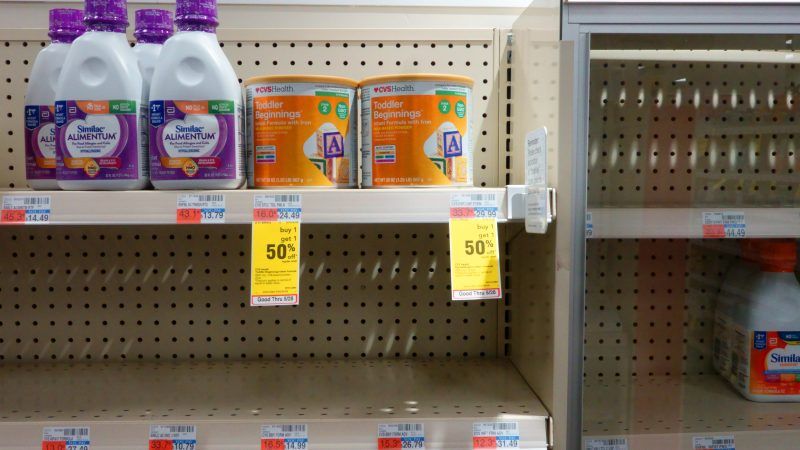USDA Announces New Rules That Could Ease Another Baby Formula Shortage
The rules would allow the government to temporarily ease restrictions on WIC formula purchases during a shortage. But those restrictions shouldn't exist in the first place.

Last week, the Department of Agriculture announced new rules for the implementation of the Access to Baby Formula Act of 2022. The new rules seek to allow the government to temporarily waive tight restrictions on formula purchases made with Special Supplemental Nutrition Program for Women, Infants, and Children (WIC) funds during emergencies and future baby formula shortages.
In February 2022, Abbot Nutrition, the largest baby formula manufacturer in the United States, announced that it was recalling three popular brands of baby formula following complaints of bacterial contamination at a manufacturing facility in Michigan. The supply shock that followed was worsened by already existing pandemic-era supply chain issues. Within months, out-of-stock rates in 10 states had climbed to over 90 percent.
Making matters worse, restrictive labeling regulations by the Food and Drug Administration and heavy tariffs made importing formula produced in the European Union practically impossible. Low-income families who used WIC to buy formula were particularly affected by the shortage, because states hand out lucrative, exclusive contracts to a single baby formula manufacturer, meaning WIC users can only buy formula from the single company their state is contracted with.
In May 2022, Congress passed the FORMULA Act, which temporarily lifted heavy tariffs on baby formula imports. The change allowed massive imports of foreign formula, easing the shortage. That same month, the Access to Baby Formula Act of 2022 was also passed, which would allow the government to temporarily waive restrictions on WIC purchases of baby formula.
Last week, the USDA finally released proposed rules concretely implementing the directions in the law. According to the proposed rule, the secretary of agriculture would gain the permanent ability to waive WIC rules during an officially declared period of emergency and 60 days after the emergency period. The rule also requires that state WIC contracts with formula manufacturers include explicit remedies in the case of a formula recall. Importantly, new contracts will allow WIC users to purchase other companies' formulas if the contracted company experiences a recall. Additionally, the new rules would require state WIC agencies to create a plan for "alternate operating procedures" in the case of a shortage or another emergency situation.
While these new rules will make it easier for families using WIC funds to access formula during shortages, state governments shouldn't be handing out exclusive, crony contacts to baby formula manufacturers in the first place. And while these rules might help during a shortage, the government would do well to remove the massive tariffs on baby formula to prevent another shortage in the first place.


Show Comments (48)